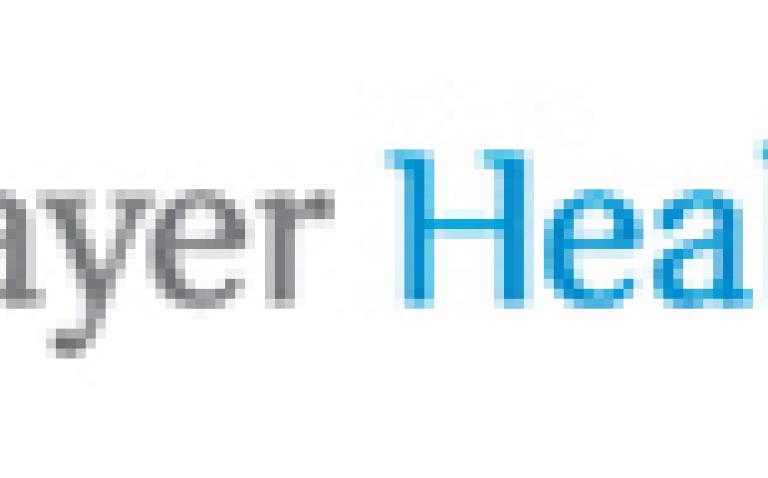Bayer today announced that a novel, convenient single-drug treatment approach with oral rivaroxaban met the primary efficacy endpoint of non-inferiority in the EINSTEIN-DVT Phase III clinical trial and showed an overall relative risk reduction compared to the current standard therapy in the treatment of deep vein thrombosis (DVT) – initial enoxaparin treatment, followed by a vitamin K antagonist.
The primary efficacy outcome in this non-inferiority trial involving more than 3,400 patients was the cumulative incidence of symptomatic recurrent venous thromboembolism (non-fatal or fatal).
Compared to standard therapy rivaroxaban conveyed a significantly improved net clinical benefit, a pre-specified secondary outcome defined as the composite of the primary efficacy endpoint plus major bleeding.
“The results of this study confirm that the novel, convenient single drug treatment approach with rivaroxaban could replace the current standard therapy in the treatment of patients suffering from deep vein thrombosis,” said Kemal Malik, M.D., member of the Executive Committee of Bayer HealthCare and Chief Medical Officer.
Rivaroxaban was well tolerated and the rate for the composite of major and clinically relevant non-major bleeding, the primary safety outcome of the study, was similar to current standard therapy. Overall safety findings in this long-term trial are in line with existing clinical data and once again confirm the good benefit/risk profile for rivaroxaban.
The full data set from the Phase III EINSTEIN-DVT study will be presented at the Hot Line Session on August 31, 2010, 11:00-12:30 CET, at the Annual Meeting of the European Society of Cardiology (ESC) in Stockholm, Sweden, by lead investigator Harry R. Buller, MD, Academic Medical Center, Amsterdam, the Netherlands.
EINSTEIN is a global clinical development program composed of three clinical studies in more than 8,000 patients: EINSTEIN-DVT, EINSTEIN-PE and EINSTEIN-Extension. Two of these studies enrolled patients with acute, symptomatic deep vein thrombosis (EINSTEIN-DVT) or pulmonary embolism (EINSTEIN-PE). In these two trials, patients received oral rivaroxaban 15 mg twice-daily for the first three weeks, followed by oral rivaroxaban 20 mg once-daily, compared with initial enoxaparin treatment followed by a vitamin K antagonist.
The multinational Phase III EINSTEIN-DVT study investigated a new single-drug approach with rivaroxaban compared with standard therapy in a randomized, open-label, assessor-blind, non-inferiority study involving more than 3,400 patients with acute symptomatic deep vein thrombosis (DVT), but without any symptoms of pulmonary embolism (PE). Standard therapy for venous thromboembolism, including DVT, currently includes two compounds: low molecular weight heparin administered by subcutaneous injection, followed by a vitamin K antagonist, which requires regular monitoring of the prothrombin time, reported as the International Normalized Ratio (INR), for safety.
Patients received either oral rivaroxaban or body weight-adjusted enoxaparin followed by warfarin or acenocoumarol, dose adjusted to maintain a therapeutic INR (target 2.5, range 2.0-3.0), for 3, 6 or 12 months, based on the physician’s assessment at baseline.
The primary efficacy outcome of EINSTEIN-DVT is the cumulative incidence of symptomatic recurrent venous thromboembolism (VTE), non-fatal or fatal pulmonary embolism (PE). The principal safety outcome is the composite of major and clinically relevant non-major bleeding.
The third study, EINSTEIN-Extension, compared the efficacy and safety of rivaroxaban to placebo in the secondary prevention of recurrent symptomatic venous blood clots by extending preventative treatment by 6 or 12 months beyond a previously completed regimen of 6 or 12 months of therapy, and enrolled approximately 1,200 patients with symptomatic DVT or PE. The results of the Phase III EINSTEIN-Extension study were presented in December 2009 at the 51st Annual Meeting of the American Society of Hematology (ASH) in New Orleans (USA). The data demonstrated that oral rivaroxaban 20 mg once-daily significantly reduced the risk of recurrent symptomatic venous thromboembolism (VTE) by 82 % compared to placebo in patients who had been treated for a previous deep vein thrombosis (DVT) or pulmonary embolism (PE). The rate of major bleeding was low.










